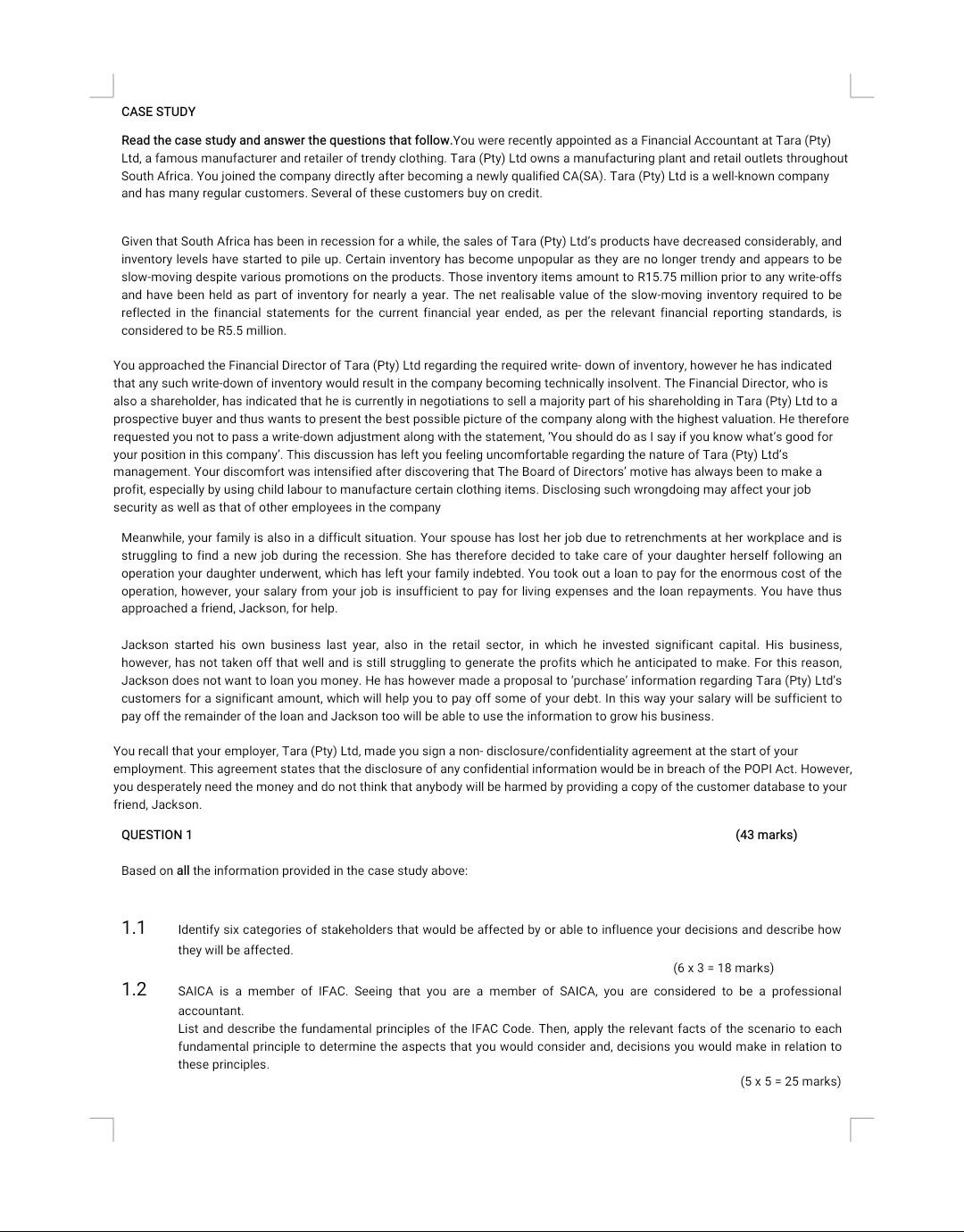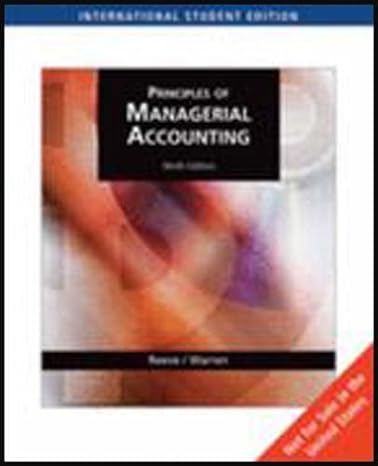Answered step by step
Verified Expert Solution
Question
1 Approved Answer
CASE STUDY Read the case study and answer the questions that follow.You were recently appointed as a Financial Accountant at Tara (Pty) Ltd, a famous

CASE STUDY Read the case study and answer the questions that follow.You were recently appointed as a Financial Accountant at Tara (Pty) Ltd, a famous manufacturer and retailer of trendy clothing. Tara (Pty) Ltd owns a manufacturing plant and retail outlets throughout South Africa. You joined the company directly after becoming a newly qualified CA(SA). Tara (Pty) Ltd is a well-known company and has many regular customers. Several of these customers buy on credit. Given that South Africa has been in recession for a while, the sales of Tara (Pty) Ltd's products have decreased considerably, and inventory levels have started to pile up. Certain inventory has become unpopular as they are no longer trendy and appears to be slow-moving despite various promotions on the products. Those inventory items amount to R15.75 million prior to any write-offs and have been held as part of inventory for nearly a year. The net realisable value of the slow-moving inventory required to be reflected in the financial statements for the current financial year ended, as per the relevant financial reporting standards, is considered to be R5.5 million. You approached the Financial Director of Tara (Pty) Ltd regarding the required write- down of inventory, however he has indicated that any such write-down of inventory would result in the company becoming technically insolvent. The Financial Director, who is also a shareholder, has indicated that he is currently in negotiations to sell a majority part of his shareholding in Tara (Pty) Ltd to a prospective buyer and thus wants to present the best possible picture of the company along with the highest valuation. He therefore requested you not to pass a write-down adjustment along with the statement, 'You should do as I say if you know what's good for your position in this company'. This discussion has left you feeling uncomfortable regarding the nature of Tara (Pty) Ltd's management. Your discomfort was intensified after discovering that The Board of Directors' motive has always been to make a profit, especially by using child labour to manufacture certain clothing items. Disclosing such wrongdoing may affect your job security as well as that of other employees in the company Meanwhile, your family is also in a difficult situation. Your spouse has lost her job due to retrenchments at her workplace and is struggling to find a new job during the recession. She has therefore decided to take care of your daughter herself following an operation your daughter underwent, which has left your family indebted. You took out a loan to pay for the enormous cost of the operation, however, your salary from your job is insufficient to pay for living expenses and the loan repayments. You have thus approached a friend, Jackson, for help. Jackson started his own business last year, also in the retail sector, in which he invested significant capital. His business, however, has not taken off that well and is still struggling to generate the profits which he anticipated to make. For this reason, Jackson does not want to loan you money. He has however made a proposal to 'purchase' information regarding Tara (Pty) Ltd's customers for a significant amount, which will help you to pay off some of your debt. In this way your salary will be sufficient to pay off the remainder of the loan and Jackson too will be able to use the information to grow his business. You recall that your employer, Tara (Pty) Ltd, made you sign a non- disclosure/confidentiality agreement at the start of your employment. This agreement states that the disclosure of any confidential information would be in breach of the POPI Act. However, you desperately need the money and do not think that anybody will be harmed by providing a copy of the customer database to your friend, Jackson. QUESTION 1 (43 marks) Based on all the information provided in the case study above: 1.1 Identify six categories of stakeholders that would be affected by or able to influence your decisions and describe how they will be affected. (63=18marks) 1.2 SAICA is a member of IFAC. Seeing that you are a member of SAICA, you are considered to be a professional accountant. List and describe the fundamental principles of the IFAC Code. Then, apply the relevant facts of the scenario to each fundamental principle to determine the aspects that you would consider and, decisions you would make in relation to these principles. (55=25marks)
Step by Step Solution
There are 3 Steps involved in it
Step: 1

Get Instant Access to Expert-Tailored Solutions
See step-by-step solutions with expert insights and AI powered tools for academic success
Step: 2

Step: 3

Ace Your Homework with AI
Get the answers you need in no time with our AI-driven, step-by-step assistance
Get Started


